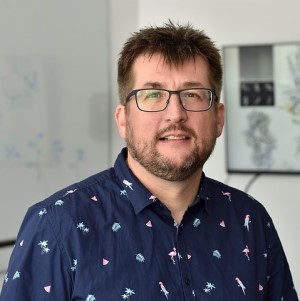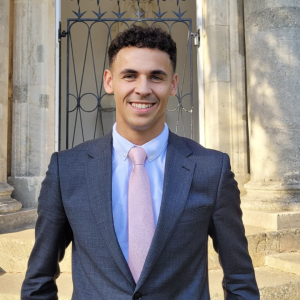The Monash Warwick Alliance tackles antimicrobial resistance

From left to right: Dr Daniel Van (University of Warwick; visiting Research Fellow), Dr Chuan Huang (Monash University), Matt Pledge (MWA PhD student), Callum Bullock (University of Warwick; visiting PhD student), Prof Greg Challis (University of Warwick and Monash University), Dr Lauren Murray (Monash University), Dr Xinyun Jian (Monash University).
The Monash Warwick Alliance has an unparalleled range of combined capabilities in infection biology, microbiology, chemical, structural and synthetic biology, synthetic chemistry and engineering. In 2022, it launched its AMR Training Program in Emerging Superbug Threats to develop the next generation of interdisciplinary researchers.
Current research and training programmes do not sufficiently develop an interdisciplinary skill set that links with industry and clinicians. Coupled with access to clinicians and translational partners and outstanding technology and research platforms, the Alliance is developing researchers with “out-of-the-box” thinking to tackle AMR effectively.
Led by Professor Greg Challis, Monash Warwick Alliance Professor of Sustainable Chemistry (Chemical and Synthetic Biology) in the Department of Chemistry at Warwick and a Chief Investigator in ARC Centre of Excellence for Innovations in Peptide and Protein Science in the Department of Biochemistry and Molecular Biology at Monash, and Professor Ana Traven, an Australian Research Council Future Fellow in the Monash Biomedicine Discovery Institute, the programme initially attracted six outstanding postdoctoral fellows (three at Warwick and three at Monash) to work on highly interdisciplinary research projects overseen by a leadership team of twelve academic staff from diverse departments at Monash and Warwick.

Professor Greg Challis explains;
"This program combines Warwick's expertise in the discovery and development of new antibiotics using cutting edge chemical, structural and synthetic biology techniques with expertise at Monash in a wide range of drug-resistant pathogens and relevant pre-clinical models of infection."
Following commencement of the programme, Warwick received £175,000 in philanthropic funding to bring onboard an additional research fellow and expand the leadership team. A grant of AUD 550,000 from the Australian Research Council to Professors Traven and Challis has enabled the recruitment of an additional research fellow at Monash.
Dr Meera Unnikrishnan, a member of the leadership team at Warwick, was awarded £2.25m by the Wellcome Trust for an 8-year programme on Clostridium difficile gut infections in collaboration with Prof Dena Lyras and colleagues at Monash. Most recently the GB Sasakawa Foundation made a £1.5m philanthropic donation, further supporting the development of AMR research training at Warwick.
This major research initiative has enabled exchange of personnel between the two institutions. In Autumn 2023, Dr Claudia Simm, one of the Monash research fellows, visited Warwick for several weeks to conduct experiments with Dr Freya Harrison. Warwick research fellow Dr Daniel Van recently arrived at Monash and will spend two and a half months working with Dr Thomas Naderer assessing the potential of a new antibiotic for treating gonorrhoea.

Matt Pledge, Alliance PhD student shared their experience of working on this major research initiative…
Why did you choose to study AMR?
AMR is a pressing global health issue and as a young scientist, the thought of helping to tackle this ongoing crisis greatly appealed to me. Also, I wanted to continue developing my skills in microbiology and biochemistry following my undergraduate studies.
What were your motivations for applying to the MWA Joint PhD?
Having completed my bachelor's and master's degrees at Warwick, I was very settled at the university and in the local area, however, part of me regretted passing the opportunity to travel to other institutions during my studies.
The MWA gave me the opportunity to continue studying at Warwick and to experience something brand new on the other side of the world.
Having discussed and agreed upon a collaborative project based on my previous experience and areas of interest, I believe the MWA PhD to be the best chance to develop my skillset and contribute to new and exciting research.
Why is it useful to work with more than one university on your research project?
Collaboration is really important in science. It allows you to utilise different areas of expertise and to approach problems from different angles, that you may not have necessarily considered alone.
For my project, working in the Challis group has helped me to improve my understanding of the biosynthesis of the antibiotic we work on, and investigate the mechanism of action, whereas, in the Li Group, I will be able to perform a series of microbiological assays that will allow us to examine our compounds activity toxicity, and pharmacokinetic properties.
Both are extremely important in demonstrating the clinical significance of a new antibiotic. Being able to access resources at both facilities has greatly expanded the possibilities for my research.
What are you most proud of in your studies to date?
I am most proud of how my understanding of biosynthesis and molecular biology has developed over my time at Warwick. This area of research was very new to me when I started the PhD, in my undergraduate studies I had focused primarily on microbiology, but working with the Challis Lab at Warwick greatly improved my understanding and comprehension of the complicated biosynthesis of natural products to the point where I am confident discussing and presenting my work.
What has been your highlight to date working on AMR?
My highlight to date is probably presenting my work at the Chemical Biology of Natural Products (CBNP) symposium.
This was quite early into my PhD so I did not have much in terms of research output but the opportunity to discuss my progress, ideas and future plans with a range of academics from different backgrounds and universities was very rewarding.
If someone was considering whether to apply to a MWA joint PhD what would you say to them?
This is an unparalleled opportunity to work in two fantastic institutions and I highly recommend it to prospective students. I would advise anyone considering applying to reach out to potential PIs and research fellows who may specialise in your field of interest. Arrange a time to meet and discuss how you could fit into their lab and potentially design a research proposal and then just go for it.MWA Joint PhD
Do you need an outstanding PhD student to support your joint research team? We award up to three full scholarships every year to help develop our future generation of internationally experienced young researchers.
